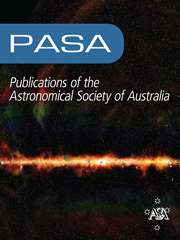Article contents
On the Gas Surrounding High-Redshift Galaxy Clusters*
Published online by Cambridge University Press: 05 March 2013
Abstract
Francis & Hewett (1993) identified two 10 Mpc-scale regions of the high-redshift universe that were seemingly very overdense in neutral hydrogen. Subsequent observations showed that at least one of these gas-rich regions enveloped a cluster of galaxies at redshift 2 ·38. We present improved observations of the three background QSOs with sightlines passing within a few Mpc of this cluster of galaxies. All three QSOs show strong neutral hydrogen absorption at the cluster redshift, suggesting that this cluster (and perhaps all high-redshift clusters) may be surrounded by a ~5 Mpc-scale region containing ~10 12 Mʘ of neutral gas. We show that if most high-redshift clusters are surrounded by such regions, the gas must be in the form of many small (<1 kpc), dense (> 0·03 cm ˗3 ) clouds, each of mass <10 6 Mʘ . These clouds are themselves probably gathered into >20 kpc-sized clumps, which may be galaxy halos or protogalaxies. If this gas exists, it will be partially photoionised by the UV background. We predict the diffuse Lyα flux from this photoionisation, and place observational limits on its intensity.
Keywords
- Type
- Research Article
- Information
- Copyright
- Copyright © Astronomical Society of Australia 2001
Footnotes
Based on observations carried out at the Anglo Australian Telescope, Cerro Tololo Interamerican Observatory and Siding Spring Observatory.
References
- 9
- Cited by


